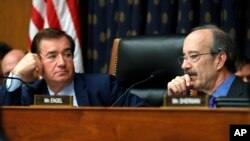Congressional lawmakers applauded the latest round of U.N. sanctions against North Korea, but said any resolution to the crisis stemming from Pyongyang's accelerated nuclear program would have to go through China.
House Foreign Affairs Chairman Ed Royce, a Republican from California, said Tuesday the “the Achilles heel” of North Korea's nuclear program is its ability to obtain the hard currency needed to purchase technology from foreign sources.
“Unfortunately years have been wasted as sanctions have been weak, allowing North Korea to access financial resources and build its nuclear and missile programs. Any sanction that crimps North Korea's access to technology is urgently needed,” Royce said during a hearing on Congress' next steps addressing the North Korean threat.
Reduced funding
If implemented, the latest U.N. Security Council sanctions adopted Monday would significantly reduce North Korean access to international currency and fuel needed for its banned ballistic missile and nuclear programs.
“Our strategy is to ramp up the sanctions regime and that's exactly what we've been doing,” testified Susan Thornton, Assistant Secretary of State for Asian Affairs. “We've had unanimous U.N. Security Council resolutions in two months, that's unprecedented.”
But lawmakers said new sanctions could only be effective if fully implemented and with additional efforts targeting the flow of hard currency from China and used by North Korea to purchase foreign technology for its weapons program.
“We need to dramatically ramp up the number of North Korea related designations. These designations do not require Beijing's cooperation. We can designate Chinese banks and companies unilaterally, giving them a choice between doing business with North Korea or the United States,” Royce said in his opening remarks.
Magnitsky Act?
Action modeled along the lines of the Magnitsky Act sanctions against Russian individuals could be an additional option, suggested one House Republican closely involved in human rights issues. The Magnitsky act is a U.S. law imposing sanctions on Russian officials the United States holds responsible for the 2009 death of Russian lawyer Sergei Magnitsky.
“We know that China subsidizes North Korea's bad behavior,” said Rep. Chris Smith, a Republican from New Jersey. “It enables torture of asylum seekers by repatriating those who escaped to China in direct contravention of the Refugee Convention and provides Kim Jong-Un a needed currency by employing thousands of trafficked workers.”
Smith noted the U.N. Commission on Inquiry on North Korea had recommended sanctions against those individuals.
Sherman skeptical
Democrats on the House panel emphasized the need to develop diplomatic options to provide North Korea with incentives for good behavior.
“This administration has said that North Korea is its top foreign policy priority, but between the President's dangerous and irresponsible communication on the matter and inexplicable reluctance to get personnel in place: he is undercutting his own peaceful pressure strategy,” said ranking House Foreign Affairs Committee member Eliot Engel, a Democrat from New York.
Another top committee Democrat was skeptical about the impact of the latest sanctions, noting the domestic political considerations of dealing with North Korea.
“For 20 years, administrations have been coming here and telling me that we don't have to make any concessions to North Korea,” said Rep. Brad Sherman, a Democrat from California. “While we haven't made America safer, we've met the political objectives here in the United States. We don't threaten China even in the little bit with country sanctions because that would be politically difficult for the United States to do.”
North Korea has conducted 16 missile tests in 2017, including two intercontinental ballistic missile (ICBM) tests and a Sept. 3 nuclear test of a possible hydrogen bomb.







